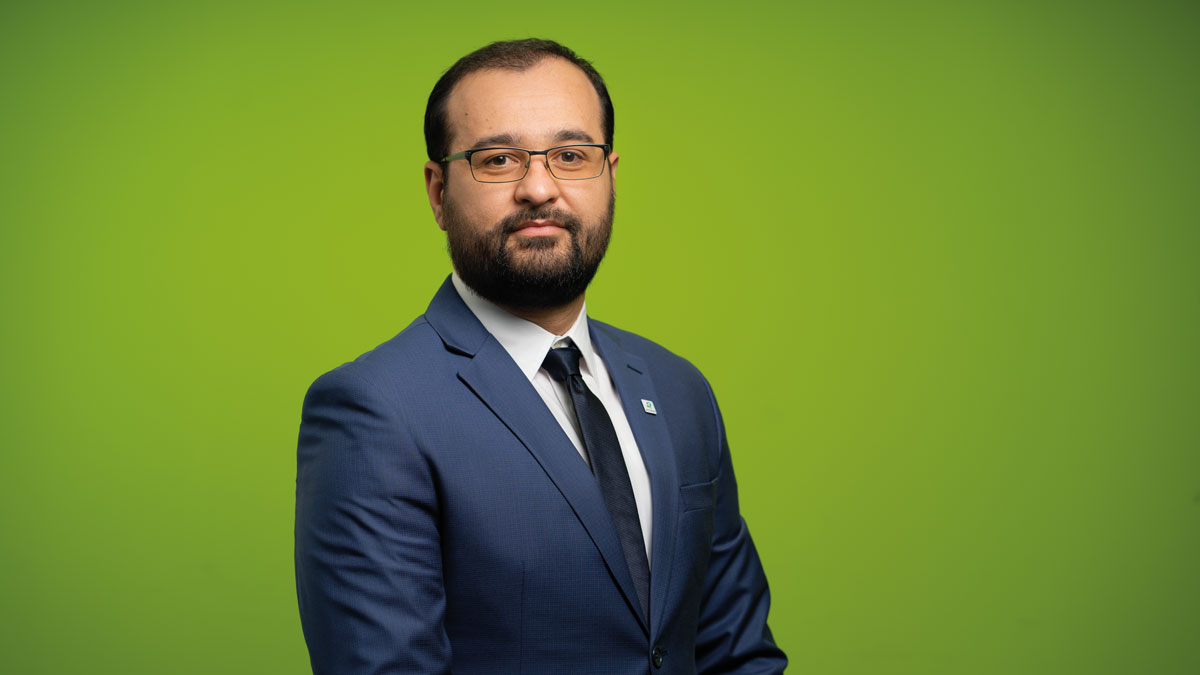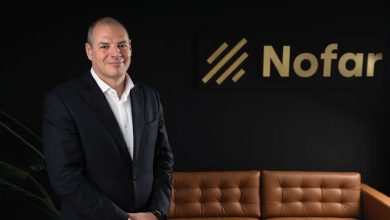George-Florin Prunaru, Process Engineering Director in Southern Europe at Bilfinger Tebodin: Economic Benefits of Digitalization and Process Technology Solutions
The multidisciplinary consultants and engineers of Bilfinger Tebodin are the technical link that transforms investor’s wishes into concrete plants. The company specializes in numerous market segments including industry, oil and gas, energy, pharmaceuticals and biopharma, property, sustainable solutions.
George-Florin Prunaru, Process Engineering Director in Southern Europe at Bilfinger Tebodin, discusses the economic benefits of digitalization and process technology solutions to improve efficiency and quality in the energy sector and other market segments.
After graduating from Petroleum-Gas University in 2012 (Faculty of Petroleum Processing Technology and Petrochemistry), George-Florin Prunaru took his first career steps at Bilfinger Tebodin (former Tebodin Consultants & Engineers) as a Process Engineer. In September 2017, he became a Business Development Manager responsible for company activities across Romania. As of October 2017, he took over the position of a Process Engineering Director and started developing technology integration team and projects. Currently, George-Florin is responsible for projects in Southern Europe (Romania & Hungary). He holds a Master’s degree in Computer aided chemical engineering for refinery and petrochemical.
Dear Mr. Prunaru, for the last nine years you have worked within the oil and gas industry, this sector experienced a period of continuous improvement and innovation. How did you perceive these transformations?
George-Florin Prunaru: It was a period of many challenges. Oil and gas industry is the most unpredictable of all market sectors. Back in 2012 when I started my career, it was a stable market with clients ready to invest and develop continuous improvement strategies. The crisis of 2015-2016 affected mostly the oil market, when many big players were reconsidering their investment plans. No wonder those decisions had an impact on design and construction companies as well. Thanks to the flexibility and diversity of engineering disciplines and specialisations, Bilfinger Tebodin was able to make a stable transition to other markets where process technology knowledge is required. We executed projects for international food, agriculture, energy, and industrial clients and keep working on those successfully. Today we are recognised on the market as a process integrator in various industries, not only oil and gas related projects.
I must say, I am glad to see such diversity of remarkable projects we are executing together with our colleagues from the region – the Czech Republic, Poland, Hungary, Ukraine, Russia, and Serbia. Such diversity and knowledge exchange enables the team to develop rapidly and always stay on top of recent developments in various markets.
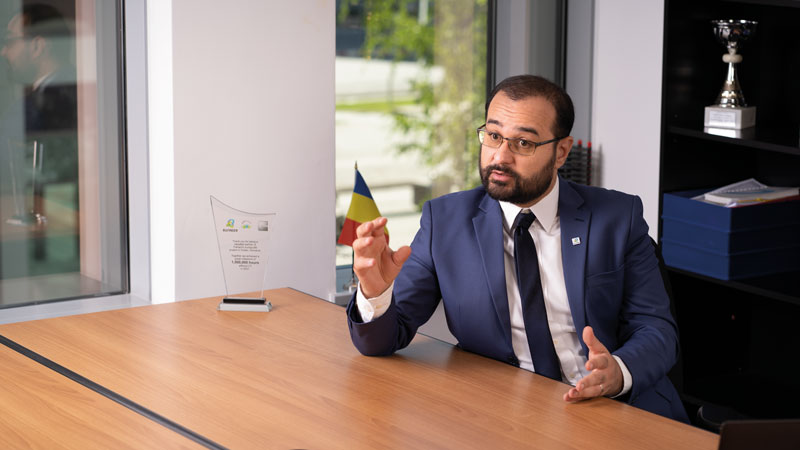
What are the ways to adapt Bilfinger Tebodin’s systems to the current global landscape? Where does your company sit in the hearts and minds of customers?
George-Florin Prunaru: Today investors do not look for pure execution. Professional management of a project, guiding them with advice and being focused on their business goals – that is what Bilfinger Tebodin aims to deliver. We are a consultant, a process integrator, a professional manager, an international company with a local knowledge – that is how our customers see us.
Over 75% of our projects and turnover come from repetitive clients. That is a key figure for me, as it is the best proof of the customers’ trust. I believe that we have gained this trust by always being close to our clients and to their needs from the early project stage until commissioning. Flexibility is a strong feature that enables us to be such a partner, and it has been a differentiator for Bilfinger Tebodin throughout its 76-year history. Our open culture combined with stable processes create a unique environment with engaged people, dedicated project approach, continuous improvement and integration of new tools that bring benefit to our clients.
As we see, the world is changing towards globalization, the market competition is growing and our clients require a united and similar approach, no matter where their projects are. To deliver same quality and ensure flawless service in any location, our structure in Central & Eastern Europe was adapted to serve the clients’ needs best. Currently we are operating in four business lines across CEE: Consultancy, Process Engineering, Engineering and PMC (project management consultancy). It means we are not a country-based company since 2018, and our international customers embraced this change towards uniting the CEE region of 800 people, as they see all benefits of a clear service split regardless the location.
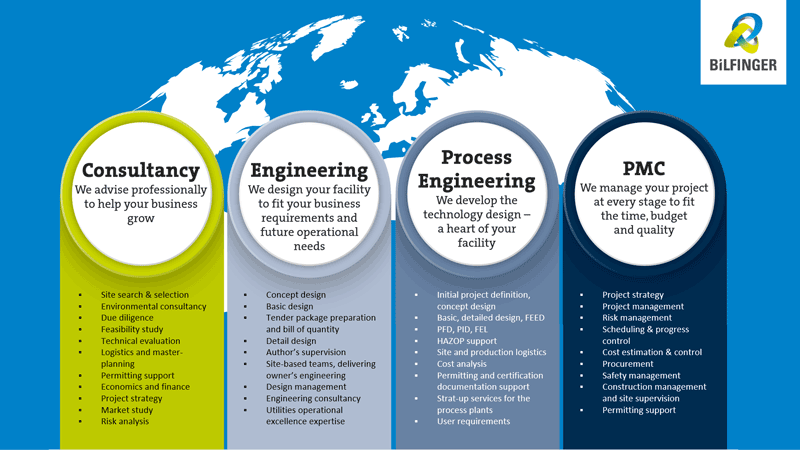
Bilfinger Tebodin covers a wide range of activities. Please describe a little bit some of most important services for your customers. What are your company’s main service attributes and benefits? Can Bilfinger Tebodin build a plant from A to Z?
George-Florin Prunaru: We support our partners with professional consulting, engineering, process technology and PMC services, managing their industrial assets and construction sites worldwide.
Being flexible means being able to support customers at any stage independently. Sometimes the investment decision is not in place yet. Then a site search or a technical due diligence is in demand. For other clients we may step in at the execution phase to ensure timing and quality by professional project management. Covering all important disciplines with our own staff enables us to provide specialized workforces and establish tailored project teams depending on the need – specialized consultants, architects, structural engineers, HVAC, electrical, road, process, piping and mechanical, instrumentation, procurement, project managers.
For complex projects, where customers require a single point and a trusted partner to manage the project from A to Z, we offer a turnkey EPCM package (engineering, procurement, and construction management). This means that we can be next to our clients from the early stages: contributing to their business idea with consultancy support, identifying best process engineering solutions, helping with all design stages, preparing tender documentation for a general contractor and selecting them, supervising construction and execution and supporting during commissioning. Such approach provides an integrated engineering solution, which minimizes interfaces between disciplines, helps avoid re-works during execution, identifies cost saving solutions and creates effective communication between the teams.
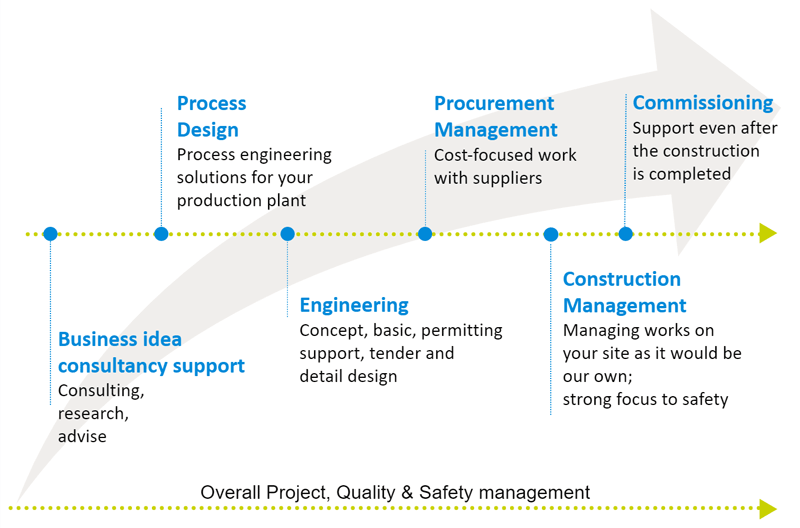
What projects are currently underway within your company?
George-Florin Prunaru: Our biggest project at the moment is a second-generation bioethanol plant for the Swiss specialty chemical company Clariant, planned to be accomplished by the end of 2021. Bilfinger Tebodin has been commissioned to deliver EPCM (engineering, procurement, overall project, and construction management) services for the construction of their commercial-scale cellulosic ethanol production using Clariant’s sunliquid® technology in southwest Romania.
Other than that, Bilfinger Tebodin runs dozens of projects across Central and Earthen Europe from various market sectors. One of the most rapidly developing sectors for us now is an automotive market. We have been awarded 10 contracts for over 650,000-million-euro investments for projects related to e-mobility. Those include all types of products to serve electric vehicles – from raw materials to final battery assemblies. We expect further growth here, as the EU has long-term plans for this industry: previously 90% of European EV batteries have been produced in Asia, and now we are glad to support new investors aiming to create self-sufficient local supply chain.
One of automotive projects in Romania is an EPCM for Michelin trucks tires factory in Zalau. Michelin decided to reduce CO2 emissions in all their factories to enable sustainable tire production. Supporting energy transition, Bilfinger Tebodin followed this challenge and implemented future-proof HVAC technical solutions for their factory.
You mentioned that Bilfinger Tebodin is managing its largest construction site for Clariant in Romania. What kind of professional services is your company providing to support this project?
George-Florin Prunaru: On behalf of Clariant, Bilfinger Tebodin provides the complete EPCM scope (engineering, procurement, construction, and project management) utilizing the force of an international team of colleagues based in the Netherlands, Romania, Poland, Czech Republic, and Ukraine. Bilfinger Tebodin is in charge of overall planning, engineering, contracting, site management and supervision of the bioethanol plant. As a site supervisor during the construction phase, Bilfinger Tebodin cooperates closely with Clariant to coordinate the work of different contractors (civil, mechanical, electrical and instrumentation) as well as to check the quality of work and takes care that all the safety rules are implemented and respected.
| Bilfinger Tebodin largest construction site for a bioethanol plant Bilfinger Tebodin has been commissioned by the Swiss specialty chemical company Clariant to deliver EPCM (engineering, procurement, overall project and construction management) services for the construction of their commercial-scale cellulosic ethanol production plant using Clariant’s sunliquid® technology in southwest Romania. The plant will produce second-generation bioethanol from agricultural residues once accomplished by the end of 2021 as planned. While the Covid-19 pandemic continues to present a challenging situation, the team is able to ensure that works on the construction site continue while fully complying with all pandemic precautionary regulations as established by the Romanian authorities. |

While a global energy transition is underway, further action is needed to reduce carbon emissions and mitigate the impact of climate change. What is Bilfinger Tebodin’s approach to dealing with this situation?
George-Florin Prunaru: Indeed, there is a need for all businesses to act fast on this subject as the European Union and local governments are establishing mitigation actions to minimize and prevent a negative environmental impact. In addition to multiple opportunities such change of industrial climate offers, it poses significant challenges and uncertainties for companies with regard to their future investments. Our engineers help investors turn this transition challenge into an opportunity and show how they could benefit from it. We help our clients focus on the skills that are essential for their business, while taking advantage of numerous opportunities emerging with the energy transition.
Luckily, the available technologies are continuously improving, with increased efficiency, lower operational costs, and extensive solutions to address engineering challenges. We support the industry in its energy transition, providing the best available technologies and services for industrial players.
As a group, we have built up over 10 years of experience and competences in hydrogen and carbon capture projects. Our energy market leaders see around 350 decarbonisation projects in the early stages of implementation in Europe, the USA, and the Middle East. Bilfinger Tebodin supports investors in those initiatives, mostly focusing to hydrogen, energy efficiency, CCUS, electrification, wind, and solar energy projects.
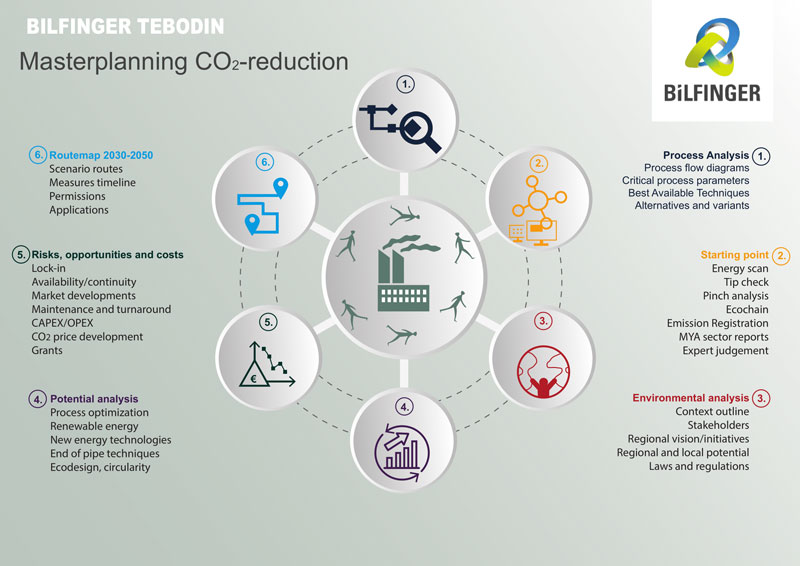
What are the essential steps towards energy transition from your point of view?
George-Florin Prunaru: The immediate shift towards zero carbon production cannot happen fast due to a number of reasons such as legacy infrastructure, extensive financing needs, significant lead times as well as technological uncertainty and high cost. Therefore, industrial decarbonisation is a multistage transition from CO2 emissions reduction to full decarbonisation. We help industrial enterprises on their decarbonisation pathway providing support within energy efficiency programs, switching to renewable energy sources, process optimizations or application of innovative technologies, such as electrolysis-based hydrogen production and carbon capture, utilization, and storage.
Having feedback from our consultancy team, who supports investors with planning of those activities, we can distinguish three stages of industrial implementation of decarbonisation projects, each with specific challenges:
- Project planning happens under market uncertainty and lack of benchmarking. Almost any energy transition project today requires involvement of project and financial partners. The investment scenario has to take into account the requirements of various stakeholders, while the technology concept has to consider core and related technologies and infrastructure needs.
- Project financing step goes next to monitor financing programs. It implies the use of financial engineering to ensure full coverage of project financing needs. The project documentation should meet the requirements of international standards and policies of funding organizations; the project model itself should include the implementation of environmental and social requirements in addition to economic indicators.
- Project implementation as a final stage implies attracting qualified partners capable of combining the implementation of local and international standards in innovative projects. At this stage, it is important to ensure the availability of infrastructure and obtain the necessary permits. Procurement strategy at this point should take into account sufficient timing of production and delivery of equipment and components, as well as turbulence in the cost of materials and other factors.
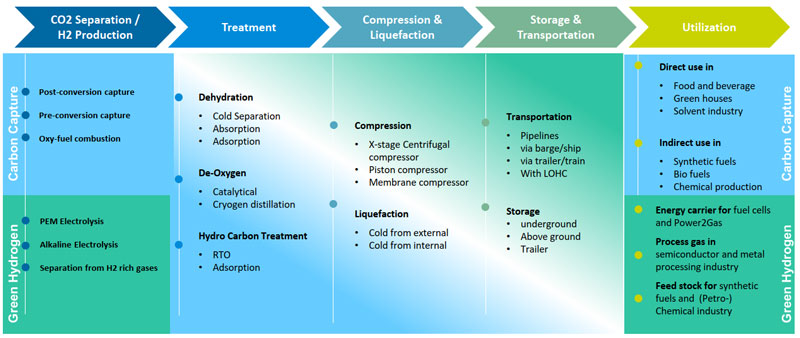
The pandemic had speed up the adoption of digital technologies and latest surveys confirm that the future will belong to companies that put technology at the centre of their outlook, capabilities, and leadership mandate. How can Bilfinger Tebodin make the most of digitalization and process technology solutions?
George-Florin Prunaru: We are constantly implementing efficient digital tools that are able to upgrade the quality, timing and safety of our service. We are also presenting to our clients some of those, which fit their needs and business objectives. For investors those may be small steps into the digitalization and increasing production efficiency. I must say that before the Covid-19 outbreak, a very small part of them embraced this as future investments. Due to the pandemic situation, more and more of our customers get interested in adding the digital technologies and solutions to our scope.
There are several different fields in which digitalization is currently developing, and we are checking each of them. No doubt that they can bring significant improvement to design, construction, or productivity. For instance, using the virtual reality and BIM modelling, we are holding safety audits on distance. Virtual reality (VR) technologies let us experience visiting the facility during the design phase, as if it’s already built. Specialists see their creation full-scale, feel its spacing; any non-conformity is immediately marked in the model, and a design solution is reconsidered to mitigate risks.
Once of the best and most demanded VR features is an opportunity to hold meetings inside the model. Participants of such meetings see and hear each other, may point on objects inside the model and discuss design solutions. You don’t necessarily need to join such meeting from the same room. In the end, we are saving costs for a client on time and travel, as well as doing design changes cheaper and easier; implementing them in a model, instead of fixing it during or after the construction is completed.
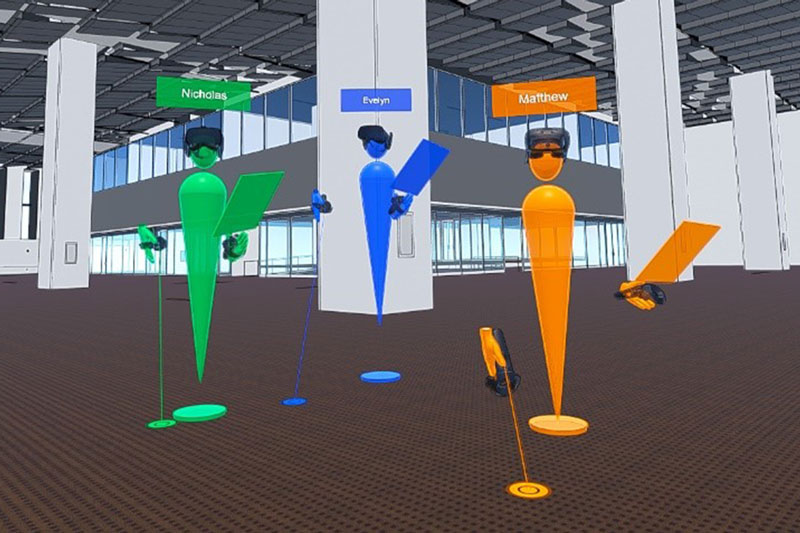
What are Bilfinger Tebodin’s future plans for Romania and/or Hungary/region?
George-Florin Prunaru: Our organisation in Central and Eastern Europe has clear objectives to grow. We are naturally driven by developing expertise in those sectors where the market is growing. For instance, in South-East Europe we focus on automotive market and electromobility, getting involved in all types of projects related to this industry – from raw materials for EV batteries to final assembly lines. Renewable sector is our strategic objective as well, with particular focus on biofuels, wind, and solar projects. As for the oil and gas market, I see a strong move towards petrochemicals. Therefore, we are growing our expertise to help companies in this transition from conventional fuels to fine chemicals.
When it comes to services, I see more and more companies coming to us with a request for consulting support on their planned investments in Romania, Hungary, or nearby countries. Such profound approach to project execution is a totally different way of thinking. Precise planning from the early stage and involving technical experts who have the local knowledge allows the investor to mitigate dozens of risks and delays on later project stages. We have decades of project experience to predict those challenges, so for such clients we focus on good consulting services from the start, using extensive knowledge of our network.
Additionally, there is a growing demand for process technology integration in industries like food or automotive. Investors usually have their own technology or the one from a licensor, and they need it to be integrated into a production facility in a best possible way. Once done right, it enables maximum efficiency, flawless logistics and a smooth operation.


